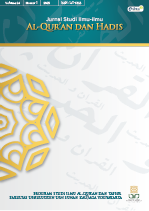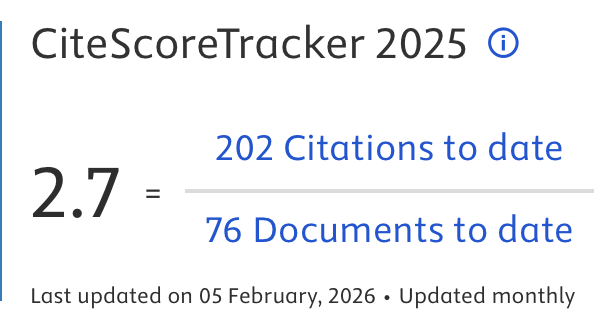Revisiting The Critical Edition of the Qur'an: Historical Perspectives and Contemporary Challenges
DOI:
https://doi.org/10.14421/qh.v25i1.4655Keywords:
Al-Qur`an Edisi Kritis, Ikhtiyâr, Orientalist, Qirâ`ât, Qur'anAbstract
The concept of a critical edition of the Qur'an resurfaced following earlier attempts by western scholars such as Bergstresser (w. 1351 AH/1933 AD), Jeffery (w. 1378 AH/1959 AD), and Pretzl (w. 1360 AH/1941 AD), who were supported by Fischer (w. 1369 H/1949 M), Baumstark (w. 1368 AH/1948 AD), Ritter (w. 1391 AH/1971 AD), and Kahle (w. 1384 AH/1964 AD). In a conference at the University of Notre Dame in April 2005, Gabriel Said Reynolds proposed “The New Reading of the Qur`an” for updating textual reseacrh on the Qur`an, after various manuscripts were discovered as research material for the Qur`an. Additionally, among those who contributed to the conceptualization of the Critical Edition of the Qur'ān is Taufik Adnan Amal, a Muslim scholar. This qualitative-historical research, I examine the ideas of the Bergstresser, Jeffery, dan Pretzl’s version of the Critical Edition of the Qur`a and Taufik Adnan Amal’s version to find out whether both of them are same or different. As well, this study aims to answer the possibility of the existence of a contemporary Critical Edition of the Qur'an as implied by both of them. Even though they use the same term, their Critical Edition of Quran do not only have similarities, but also have differences. As for the possibility of using the ikhtiyâr technique at the present time to produce a Critical Edition for the Qur`an, many factors must be considered and should comply with the conditions that apply. One of them, if it is still possible, there are maqbûl readings outside the ten. The reciters who perform ikhtiyâr must also have a sanadreaching to Rasulullah saw.
References
Abah, Muhammad al-Mukhtar Walid, Târîkh al-Qirâ’ât fî al-Masyriq wa al-Maghrib, Isesco: al-Mandhamah al-Islamiyah li Tarbiyah wa al-‘Ulum wa ats-Tsaqafah, 2001.
Amal, Taufik Adnan. “Edisi Kritis Al-Qur`an”. In Wajah Liberal Islam di Indonesia, edited by Luthfi Assyaukanie. Jakarta: JIL, 2002.
Amal, Taufik Adnan. Rekonstruksi Sejarah Al-Qur`an. Ciputat: PT. Pustaka Alvabet, 2013.
al-Amin, Ihsan. Manhaj an-Naqd fî at-Tafsîr. Beirut: Dar al-Hadi, 2007.
al-Andalusi, Muhammad ibn Yusuf asy-Syahid Abi Hayyan. Tafsîr al-Bahr al-Muhîth, Juz 3. Beirut: Dar al-Kutub al-‘Ilmiyah, 1993.
Armas, Adnin. Metodologi Bibel dalam Studi Al-Qur`an. Jakarta: Gema Insani, 2005.
al-Azami, M.M. Sejarah Teks Al-Qur`an dari Wahyu Sampai Kompilasi. Translated by Sohirin Solihin, dkk. Depok: Gema Insani, 2014.
al-Badawi, Abdurrahman. Mausû’ah al-Mustasyriqîn terj. Amroeni Drajat. Yogyakarta: LKiS, 2003.
Azwar, Zainal, Mhd Ilham Armi, Zulfan Zulfan, Ahmad Bakhtiar bin Jelani, and Ahmad Luthfy Nasri. “Child Filiation and Its Implications on Maintenance and Inheritance Rights: A Comparative Study of Regulations and Judicial Practices in Indonesia, Malaysia, and Turkey.” Journal of Islamic Law 5, no. 1 (February 29, 2024): 62–85. https://doi.org/10.24260/jil.v5i1.2326.
Bell, Richard. Introduction to the Qur`an, London: The Edinburgh University Press, 1953.
al-Farmawi, Abu al-Hayy Husain. Rasm al-Mushaf wa Naqthuhu, Makkah: al-Maktabah al-Makkiyyah, 2004.
Goldziher, Ignaz. Madzab Tafsir. Libanon: Dar Iqra`, 2006.
al-Hamad, Ghanim Qadduri. Rasm al-Mushaf Dirâsah Lughawiyyah Târikhiyyah. tt.: Dar Amar, 2001.
Herlina, Nina. Metode Sejarah. Bandung: Satya Historika, 2020.
Ibn Jinni, Abi al-Fath Utsman. al-Muhtasab fî Tabyîn Wujûh Syawâdz al-Qirâ`ât wa al-Îdhâh ‘anhâ, t.tp: al-Majlis al-A’la, 1420.
Ibn Mujahid, Ahmad ibn Musa. as-Sab’ah fî al-Qirâât. Mesir: Dar Ma’arif, t.th.
al-Jazari. Munjid al-Muqriîn wa Mursyid ath-Thâlibîn. Beirut: Dâr al-Kutub al-‘Ilmiyah, 1980.
al-Jazari. Ghâyah an-Nihâyah fî Thabaqât al-Qurâ`, Juz II. Beirut: Dar al-Kitab al-Ilmiyah, 2006.
al-Jazari. An-Nasyr fî Qirâât al-‘Asyr. Beirut: Dar al-Kitab al-Ilmiyah, tt.
Jeffery, Arthur. Material for the History of the Text of the Qur`an. Leiden: E.J. Brill, 1937.
Koentjaraningrat. Metode-metode Penelitian Masyarakat. Jakarta: Sarasin, 1996.
Madzkur, Zainal Arifin. Perbedaan Rasm Usmani. Jakarta: Azzamedia, 2018
Mudin, Moh. Isom. Sejarah Kodifikasi Mushaf Utsmani: Kritik atas Revisionis & Liberal. Jurnal Tasfiyah: Jurnal Pemikiran Islam, 01 (2). (2017). https://doi.org/10.21111/tasfiyah.v1i2.1855.
Mudzhar, Atho’. Pendekatan Studi Islam, dalam Teori dan Praktik. Yogyakarta: Pustaka Pelajar, 1998.
Muhammad, Ahsin Sakho. Membumikan Ulumul Qur`an. Jakarta: Qaf, 2019.
Muna, Afrida Arinal, and Munirul Ikhwan. “Ibn Mujahid’s Canonical Legacy: Examining Sanad Authentication and Political Factors in the Standardization of Qirā’āt Sab’ah.” Jurnal Studi Ilmu-Ilmu Al-Qur’an Dan Hadis 24, no. 2 (July 31, 2023): 359–82. https://doi.org/10.14421/qh.v24i2.4567.
Nawawi, Fuad. “Konstruksi Pengetahuan Pengkritik dan Pembela Qirâât Sab’ah (Analisis Perbandingan Pemikiran Zamakhsyari dan Abu Hayyan tentang Ragam Qirâât Al-Qur`an)”. Disertasi—UIN Syarif Hidayatullah, 2020.
Noeldeke, Theodor dkk. The History of the Qur`ân. Leiden: Brill, 2013.
Noer, Kautsar Azhari. Mempersoalkan Otentisitas Al-Qur`an Bersama Theodor Noldeke. Jurnal Titik Temu, 03 (1), (2010).
Puin, Gerd R. “Observations on Early Qur`an Manuscripts in San’a”. In The Qur`an as Text. Edited by Stefan Wild. Leiden: E.J. Brill, 1996.
Reynolds, Gabriel Said. “Introduction”. In The Qur`an in Its Historical Context. Edited by Gabriel Said Reynolds. London and New York: Routledge, 2008.
Rusmana, Dadan. Metode Penelitian Al-Qur`an dan Tafsir. Bandung: CV Pustaka Setia, 2015.
Salim, Fahmi. Kritik Terhadap Studi Al-Qur`an Kaum Liberal. Depok: Perspektif, 2017.
Sirry, Mun’im. Kontroversi Islam Awal antara Madzab Tradisionalis dan Revisionis. Bandung: Mizan, 2015.
Sirry, Mun’im. Tradisi Intelektual Islam Rekonfigurasi Sumber Otoritas Agama. Malang: Madani, 2015.
Sukmadinata, Nana Syaodih. Metode Penelitian Pendidikan. Bandung: PT Remaja Rosdakarya, 2013.
as-Suyuthi, Jalaluddin Abdurrahman. al-Itqân fî ‘Ulûm Al-Qur`ân. Kairo: Dâr al-Alamiyah, 2017.
Syukri, Ahmad Khalid, dkk. Muqaddimât fî ‘Ilm al-Qirâât. Oman: Dar ‘Imâr, 2001.
Yusup, Andi Asdar. Metode Bibel Dalam Pemaknaan Al-Qur`an (Kajian Kritis Terhadap Pandangan Revisionis). Jurnal Hunafa: Jurnal Studia Islamika, 13 (July 20, 2016). https://doi.org/https://doi.org/10.24239/jsi.v13i1.413.35-65.
al-Zarqani, Muhammad Abdul Adzim. Manâhil al-‘Urfân fî ‘Ulûm al-Qur`ân I. Beirut: Dar al-Fikr, 1988.
Zuchdi, Darmiyati. Panduan Penelitian Analisis Konten. Yogyakarta: Lemlit IKIP Yogyakarta, 1993.
Downloads
Published
Issue
Section
License
Copyright (c) 2024 Khusna Farida

This work is licensed under a Creative Commons Attribution-NonCommercial-NoDerivatives 4.0 International License.
Publishing your paper with Jurnal Studi Ilmu-ilmu al-Qur'an dan Hadis means that the author or authors retain the copyright in the paper. Jurnal Studi Ilmu-ilmu al-Qur'an dan Hadis uses license CC-BY-NC-ND or an equivalent license as the optimal license for the publication, distribution, use, and reuse of scholarly works. This license permits anyone to copy and redistribute the material in any medium or format and must give appropriate credit, provide a link to the license, and indicate if changes were made. If you remix, translate, transform or build upon the material you may use it for private use only and not for distribution. Jurnal Studi Ilmu-ilmu al-Qur'an dan Hadis granted an exclusive non-commercial reuse license by the author(s), but the author(s) are able to put the paper onto a website, distribute it to colleagues, give it to students, use it in your thesis, etc, so long as the use is not directed at a commercial advantage or toward private monetary gain. The author(s) can reuse the figures and tables and other information contained in their paper published by Jurnal Studi Ilmu-ilmu al-Qur'an dan Hadis in future papers or work without having to ask anyone for permission, provided that the figures, tables, or other information that is included in the new paper or work properly references the published paper as the source of the figures, tables or other information, and the new paper or work is not direct at a private monetary gain or commercial advantage.
Jurnal Studi Ilmu-ilmu al-Qur'an dan Hadis journal Open Acces articles are distrubuted under the Creative Commons Attribution-NonCommercial-NoDerivatives 4.0 International (CC BY-NC-ND 4.0). Article can be read, copy and redistribute the material ini any medium or format under the following conditions:
Attribution — You must give appropriate credit, provide a link to the license, and indicate if changes were made. You may do so in any reasonable manner, but not in any way that suggests the licensor endorses you or your use.
NonCommercial — You may not use the material for commercial purposes.
NoDerivatives — If you remix, transform, or build upon the material, you may not distribute the modified material.











